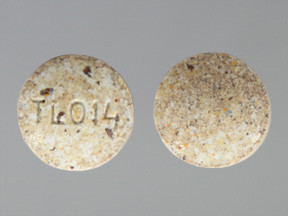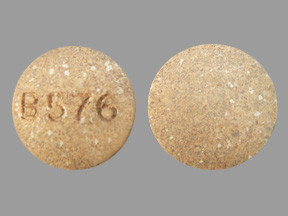PRENATAL VITAMINS/IRON/FOLIC ACID CHEWABLE TABLET - ORAL
PHONETIC PRONUNCIATION:
GENERIC NAME(S): prenatal vitamins no.14/ferrous fumarate/folic acid
Uses
USES: This medication is a multivitamin and mineral product used to treat or prevent vitamin deficiency due to poor diet, certain illnesses, or during pregnancy. Vitamins are important building blocks of the body and help keep you in good health. Women of childbearing age should maintain adequate levels of folic acid either through diet or supplements to prevent infant spinal cord defects.
How to use PRENATAL VITAMINS/IRON/FOLIC ACID CHEWABLE TABLET - ORAL
HOW TO USE: Chew and swallow this medication by mouth, usually once daily on an empty stomach (1 hour before or 2 hours after a meal) or as directed by your doctor. If stomach upset occurs, you may take this medication with food. Avoid taking antacids, dairy products, tea, or coffee within 2 hours before or after this medication because they will decrease its effectiveness. Use this medication regularly in order to get the most benefit from it. To help you remember, take it at the same time each day.
Side Effects
Precautions
Interactions
Overdose
Images
Reviews
Faq for PRENATAL VITAMINS/IRON/FOLIC ACID CHEWABLE TABLET - ORAL
Prenatal vitamins are important during pregnancy because they provide essential nutrients that support the development and growth of the baby. These vitamins help prevent certain birth defects, support the mother's overall health, and ensure proper nutrition for the growing baby.
Prenatal vitamins typically contain important nutrients such as folic acid, iron, calcium, vitamin D, omega-3 fatty acids, and various other vitamins and minerals. These nutrients are crucial for the healthy development of the baby's brain, bones, and overall growth.
The recommended daily dosage of folic acid for pregnant women is 600-800 micrograms. Folic acid helps in the formation of the baby's neural tube and reduces the risk of serious birth defects related to the brain and spine.
Yes, chewable prenatal vitamins are an excellent option for women who have difficulty swallowing pills. These tablets are designed to be chewed and then swallowed, making it easier for those who struggle with large pills.
Iron is an essential nutrient during pregnancy as it helps in the production of red blood cells and prevents iron deficiency anemia. Pregnant women often require more iron than they can get from their diet alone, so taking iron supplements, along with prenatal vitamins, is highly recommended.
Most prenatal vitamins, including those containing iron and folic acid, are available over the counter and can be purchased without a prescription. However, it is always advisable to consult with your healthcare provider before starting any new supplement.
Ideally, prenatal vitamins should be started at least one month before conceiving or as soon as you find out you are pregnant. This early intake ensures that you have adequate nutrient levels to support the baby's development from the very beginning.
While most women tolerate prenatal vitamins well, some may experience mild side effects such as nausea, constipation, or upset stomach. If any side effects persist or worsen, it is best to consult your doctor.
Prenatal vitamins are specifically formulated to meet the nutritional needs of pregnant women. While taking them when not pregnant won't harm you, it may lead to excessive consumption of certain nutrients. It is generally recommended to switch to regular multivitamins if not planning for pregnancy.
Warning
WARNING: Accidental overdose of iron-containing products is a leading cause of fatal poisoning in children under 6 years of age. Keep this product out of reach of children. If overdose does occur, seek immediate medical attention or call a poison control center. Folic acid may affect certain laboratory tests for vitamin B12 deficiency (pernicious anemia) without treating this anemia. Therefore, folic acid should not be taken alone when treating vitamin B12 deficiency. Consult your doctor or pharmacist for details.
Disclaimer
IMPORTANT: HOW TO USE THIS INFORMATION: This is a summary and does NOT have all possible information about this product. This information does not assure that this product is safe, effective, or appropriate for you. This information is not individual medical advice and does not substitute for the advice of your health care professional. Always ask your health care professional for complete information about this product and your specific health needs.




No Reviews Yet